Turning Waste into a Source
OUR GOAL is to have you to RETHINK ordinary waste by learning about Ada County Landfill’s waste management.
Effective waste management depends on user knowledge and participation. Determination of what is ordinary waste starts with you. Ada County Landfill’s recycling, waste diversion, and reuse programs curb what is buried as ordinary waste. Your participation will extend the life of the Ada County Landfill and protect the environment.
How to Recycle Batteries
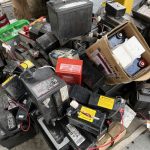
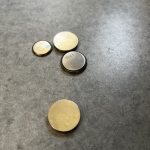
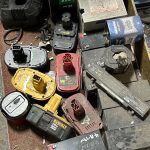
Please bring batteries to the Household Hazardous Waste Facility at Ada County Landfill or to a HHW Mobile Collection Site. They are hazardous and do not belong in your garbage or recycling bin, garbage trucks, or the landfill.
Accepted batteries:
- Nickel-Cadmium (NiCads or rechargeable)
- Lithium
- Lithium Ion
- Button
- Nickel Metal Hydride (Ni-MH)
- Alkaline batteries (AA, AAA, C, D) can go into the trash
- Auto batteries accepted separately
Ada County Landfill Household Hazardous Waste Facility- There is no limit to the number of batteries that can be brought to the HHW Facility located at the Ada County Landfill. Learn more about schedule and hours of operation: Ada County Household Hazardous Waste Facility
Household Hazardous Waste Mobile Collection Sites- Residents may bring one Household Battery Collection Bag per visit to any HHW Mobile Collection Site. Learn more about mobile collection dates and locations: Household Hazardous Waste Mobile Collection Sites
This program is free to Ada County residents (incorporated and unincorporated areas) and is sponsored by Ada County, Boise City Public Works, Republic Services, and PSC Environmental Services.
The Household Hazardous Waste Material Collection Program is available to all residents of Boise, Eagle, Garden City, Kuna, Meridian, Star, and unincorporated areas of Ada County.
Battery Bags are available at the Mobile Collection Sites and at the Ada County Landfill Household Hazardous Waste Facility.
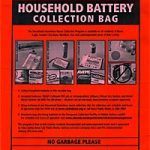
What does it cost?
No charge for Ada County Residents
Small quantity business generators should contact the Household Hazardous Waste Facility to determine costs.
Questions?
Contact:
The Household Hazardous Waste Facility
(208) 577-4737
[email protected]
Boise Public Works
208-384-3901
How to Curbside Recycle
Curbside recycling is a contracted service through Republic Services or Hardin Sanitation. Learn more about curbside recycling in your community:
| Ada County | Boise | Eagle |
| Garden City | Meridian | Star |
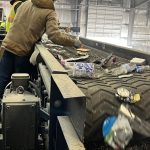
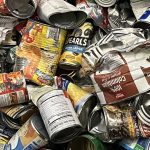
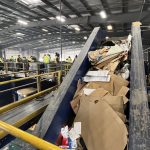
WHEN IN DOUBT; THROW IT OUT!
If you are unsure of what can go in the bins, it is best to simply throw the item in your garbage can.
CLEAN, DRY, & EMPTY
This improves quality and recyclability of the materials.
WHAT GOES IN THE BIN?
Paper
- Newspapers (including inserts), magazines, and paper catalogs
- Mixed Paper – white or pastel paper, non-corrugated boxes (paperboard) with liners removed, cereal and frozen food boxes with liners removed, phonebooks, envelopes with or without windows, paper bags, wrapping paper (no foil), school papers (without glitter/glue), and junk mail. Neon colored paper is not accepted.
- Clean paper egg cartons and drink carriers
Aluminum and Steel (tin) Cans
- Empty cans must be rinsed; labels may remain on cans
- Aerosol cans must be empty
- Pesticide and chemical cans are prohibited curbside but can be disposed of at any household hazardous material mobile collection site
Plastics
- Bottle-shaped or jar-shaped plastics with a number 1 or 2 on the bottom of the container. These include: plastic milk jugs, rigid plastic soda, rigid fruit juice bottles, and plastic jars.
No filmy plastic, “crinkly water bottles,” grocery bags, vinyl, or “Styrofoam” will be accepted in your loose mixed-waste recycling bin. They are not processed in the same way as #1-2 plastics and/or they get caught in the machinery at the recycling center.
- Hefty ReNew Bags (orange) can be filled with hard-to-recycle plastics labelled #4-7, including grocery bags, plastic film, clean food packaging, and “Styrofoam”. No number 1-3 plastics. Fill the bag, tie it tightly, and place inside your recycling bin with the loose mixed recycling.
Corrugated Cardboard
- Break boxes down to no larger than 4′ x 4′ and place under or next to bin
- City of Meridian residents: break boxes down to no larger than 2′ x 2′ and placed under or next to the bin.
Used Motor Oil
- Special curbside requirements – Learn more
WHAT DOES NOT GO IN THE BIN?
- Plastics that are lighter in weight and/or have the number 3-7 printed on the bottom- unless they are secured in an orange Hefty ReNew Bag.
- No filmy plastic, grocery bags, bubble wrap, vinyl, or Styrofoam- unless secured in an orange Hefty ReNew Bag.
- Clear plastic clamshells and produce boxes
- Aluminum (tin) foil has a different makeup than aluminum cans. As with incompatible plastics, incompatible aluminum fouls the recycling process.
- Pizza boxes- currently not accepted at local recycling
- Foil-lined food containers and other multi-material fused packaging
- Paperboard milk cartons or juice cartons. Any paperboard container that has a wax (or plastic) coating cannot be recycled. Like sticky food residue, wax can damage the recycling equipment.
- Paint and other cans with caution words on the label
- Paper plates and cups, tissues, paper towels, and napkins- human sorters cannot tell if these are clean or not. They will get tossed and slow down recycling.
- Glass
Special Curbside Recycling
Learn more about seasonal or special curbside programs:
- Christmas Tree
- Grasscycling
- Leaves
- Motor Oil
As a waste diversion tactic, curbside SINGLE-STREAM recycling is both popular and effective. Every single family residence in Ada County is eligible to participate in the curbside recycling program.
This program is supplemented by vast amounts of recyclable materials that are taken directly to the area’s recycling centers by people and businesses in Ada County.
Interesting Facts
- SINGLE-STREAM recycling eliminates the need to place your recyclable materials in separate bags or bins.
- Placing the wrong items in a recycle bin can contaminate an entire load. It turns recyclable resources into the trash. Please take care when loading your recycle bin. It is better to recycle fewer items well than to guess. Properly recycled items add up!
- Recyclables should be loose, not bagged – except for the orange Hefty ReNew bags for plastics recycling that go inside or on top of your recycling bin.
Questions?
Ada County Landfill
(208) 577-4725
[email protected]
Republic Services (Boise, Meridian, Star)
(208) 345-1265
Hardin Sanitation (Unincorporated Ada County & Eagle)
(208) 642-2629
J&M Sanitation (Kuna)
(208) 922-3313
How to Recycle E-Waste
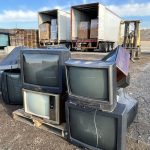
| Acceptable Materials | ||||
| COMPUTER SYSTEMS & ACCESSORIES CRT Monitors LCD Displays CPUs All-in-Ones Laptops Servers Switches Hubs UPS Systems Keyboards & Mice Speakers Hard Drives Optical Drives Wires & Cables Circuit Boards Docking Stations Routers External Disk Drives Networking Equipment RAM/Memory Server Racks |
AUDIO & VIDEO EQUIPMENT Televisions DVD Players VCRs Stereos Camcorders Cameras Radios Game Systems Speakers iPods/MP3 Players Projectors |
OFFICE EQUIPMENT Fax Machines Photo Copiers Printers Scanners Surge Protectors Telephones Typewriters Adding Machines |
HANDHELD DEVICES Cell Phones Pagers PDAs Two-Way Radios |
MISC. Microwaves Air Cleaners Humidifiers GPS Units Non-Hazardous Medical Equipment Electric Power Tools Answering Machines |
How to Recycle Televisions & Computer Monitors
How to Recycle at the Landfill
Bring your E-waste to the Ada County Landfill (regular hours Monday-Saturday) and they will be processed separately since many of them contain lead and/or lithium ion batteries. There is no limit to the number of items that can be recycled, however, an appointment must be made if there are more than ten.
Household Hazardous Waste Mobile Collection Sites
Ada County residents can bring televisions and computer monitors to mobile collection sites free of charge if they contain Cathode Ray Tubes (CRTs). TVs must be smaller than 27″ to be accepted at the collection sites. Learn more about mobile collection dates and locations:
Household Hazardous Waste Mobile Collection Sites
Electronics are manufactured with many materials that are recyclable. The Ada County Landfill Recycling Center accepts unwanted electronics.
Interesting Facts:
- Older televisions and computer monitors contain as much as 8 pounds of lead!
- A significant threat to human and animal well-being can occur if lead leaches into the ground and water supplies.
- Rechargeable batteries can cause trash fires and must be handled separately.
Questions?
Ada County Landfill
(208) 577-4725
[email protected]
How to Recycle Glass
Glass is not currently recycled at the Ada County Landfill. For Boise residents, collection sites have been established around the city through the efforts of:
- City of Boise
- Ada County Highway District
- Republic Services
Here is a list of convenient locations where Boise residents may recycle glass:
- Western Recycling- 1990 South Cole Rd., Boise
- Boise Recycling- 4725 Glenwood, Garden City
- Pacific Recycling- 5120 Emerald St., Boise
- Republic Services- 11101 W. Executive Dr., Boise
- Albertson’s at 16th and State Street, Boise
- Boise Fire Station #3- 2202 Gekeler Ln., Boise
- Boise Fire Station #6- 6933 W. Franklin Rd., Boise
- Boise Fire Station #8- 4422 Overland Rd., Boise
- Boise Fire Station #10- 12065 W. McMillan, Boise
- Boise Fire Station #12- 3420 State Hwy. 21, Boise
- Old Amory- 801 Reserve St., Boise
Glass
Locally, recycling glass is somewhat problematic. We are long distances from resources that use glass in their manufacturing processes. Glass is heavy, breakable, and transportation costs decrease profitability in glass recycling. Some Ada County municipalities do have a fee-based curbside pick up option.
For more information contact Boise Public Works Department (208) 384-3901
or visit Boise Curb It website: Recycling | City of Boise
Grass clippings are accepted at the Ada County Landfill but if you are interested in composting your grass clippings, here are some tips:
Curbside Grass Composting/Recycling
Programs vary depending on your city. For specific information:
How to Grasscycle By Mowing
Grasscycling is the practice of leaving clippings on the lawn rather than throwing them away where they take up space in the landfill. Studies have shown that Grasscycling makes lawns greener and healthier. Grass clippings are a valuable source of nitrogen needed for healthy lawns.
- Any lawn mower will work, but a mulching mower works best.
- Don’t remove more than 1 inch or 1/3 of the grass blade. Removing too much reduces nutrient reserves, causing stress and browning.
- Keep mower blades sharp. Sharp blades cut the clippings into smaller pieces. This also provides a cleaner cut and prevents tearing and browning the grass tips.
- Mow frequently; every 5 to 6 days or 5 times a month during the growing season. This increases grass shoot density which inhibits weed growth. Although you may be mowing more often, You may save time by not bagging the clippings.
- Try not to mow when the grass is too wet. Wet grass clumps and does not scatter easily. If you have clumps, trying mowing a second time to further break up the clumps or bag the clippings for compost or mulch.
Tips for a Healthier Lawn
- Fertilize while the grass is actively growing (spring and fall). Fall fertilizing is important for developing strong root systems capable of supporting vigorous leaf growth.
- Use slow-release or water-insoluble fertilizer. Fertilizers that release nitrogen too quickly cause rapid leaf growth at the expense of healthy stem and root growth. Over-fertilizing can pose a threat to ground and surface water.
- Infrequent, long irrigation cycles promote deep root zones more capable of withstanding drought conditions.
- Water at night or early morning to reduce water loss to evaporation.
- Contrary to the myth, clippings do not promote thatch build up. Clippings break down quickly, often in a matter of a few weeks. Thatch is the build-up of roots and stems and is commonly the result of over-fertilizing and excessive watering.
Interesting Facts:
Grasscycling…
- Saves time! Up to 35% of your lawn care time is spent emptying your mower bag, raking up clippings, bagging clippings and dragging them to the curb.
- Saves money since you don’t have to buy clipping bags, and you don’t have to fertilize or water your lawn as often
- Shelters grass roots from the sun conserve moisture and reduce weeds and the incidences of certain lawn diseases
- Creates a natural fertilizer. Grass clippings are 80% water. Once cut, the clippings wither, shrink and sift down to the ground. Microorganisms break down the clippings making the nutrients in the clippings available to the lawn.
Questions?
For general information regarding mulching, contact:
University of Idaho Extension, Ada County
(208) 287-5900
[email protected]
![]()
Free Leaf Disposal at the Landfill is seasonal. We are no longer accepting leaves for free.
How to Recycle Leaves Curbside:
Hardin Sanitation and Republic Services, in partnership with the various municipalities of Ada County, provide for curbside leaf collection. Programs and schedules vary.
For curbside collection in your community visit these links:
| Unincorporated Ada County | Boise | Eagle |
| Garden City | Meridian | Star |
Leaf Processing at the Ada County Landfill
MM Demolition and Timber Creek Recycling process the leaves at the Ada County Landfill. The following steps are how they manage the leaf material.
Staging: Contractors and the public bring their leaves into the staging areas where they dump into one of two places. The leaves are sorted into separate staging areas for safety reasons.
Inspecting: Once loads are placed in the staging area, their on-site manager inspects the piles for contamination including trash, metal, pressure treated material, trailer hitches, non-compostable leaf bags, etc. After inspection, they use a loader to push up the material into a larger pile.
Monitoring/Probing: For the remainder of the season the larger pile will be probed to check the temperature to ensure the pile does not spontaneously combust and catch fire. If the pile is observed above ambient temperature, the pile is disrupted with a loader to release heat or it is hauled off as soon as possible.
Grinding: Once a pile has reached a size large enough to establish a week (or more) of grinding, they bring in a 1050 horse powered grinder. They use a 962k loader to load the material into the grinder. Sometimes this process is done at the landfill or at other approved locations.
Hauling: MMD uses their 962k with a rollout bucket to load high sided trucks. TCR has a fleet of 30 trucks to manage the material that ranges from 30 yard (15 ton) to 150 yard (32 ton) capacity. TCR efficiently uses back hauls to ease the burden of truck traffic into the landfill, hauling trash in and recyclables out from the wood waste recycling area.
Further Processing: TCR has a recycling facility permit that allows them to compost the leaf material by DEQ standards. They also have an air system that further pulls out additional plastics that were missed. The purpose of this process it to stabilize the material so it is able to be used by farmers, add other materials to become a valuable commodity, further reduce the risk of pathogens and foodborne illnesses, kill weeds seeds, and much more.
Questions?
Ada County Landfill
(208) 577-4725
[email protected]
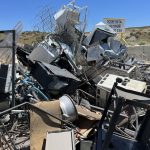
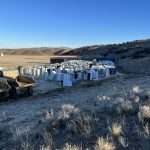
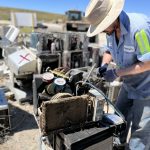
How to Recycle Metals
Bring your metal appliances and scrap metal to the Ada County Landfill Diversion/Recycling Area where they will be separated and shipped to a local metals recycler.
How to Recycle Refrigerated Appliances
Bring your EMPTY refrigerator/freezer or your refrigeration units (ACs) to the Ada County Landfill Diversion/Recycling Area where qualified technicians will remove Freon and other refrigerants from units. The metal cases from the appliances are then shipped to a local metal recycler. $25 extra fee for refrigerated appliances due to refrigerant check and removal. We are not able to accept commercial-size units.
The Ada County Landfill Diversion/Recycling Area takes:
- appliances and scrap metal
- aluminum
- steel
- copper
- other metal materials
- electrical cords (incl. extension cords, Holiday lights, etc.) – please use designated bin
Interesting Facts:
- Freon is a greenhouse gas
- Freon would damage the ozone layer of the atmosphere if released from these refrigeration units
- Items that are mostly metal like work-out equipment and grills can also be recycled
- Bicycles are donated to Recycle-a-Bicycle program or recycled
- Lawn mowers and weed-eaters contain hazardous waste and need to be deposited near metal recycling
Questions?
Ada County Landfill
(208) 577-4725
[email protected]
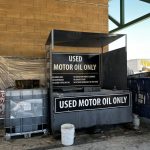
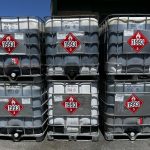
How to Recycle Cooking Oil
Take up to two gallons to the Household Hazardous Material Waste Facility open Fridays and Saturdays from 8:00 AM to 6:00 PM.
- Label container “Used Cooking Oil”
- Do not mix with motor oil and make sure it does not contain food
How to Recycle Motor Oil
Requirements:
- No mixed oils
- No antifreeze
- No other types of oil, motor oil only
- No brake or parts cleaners
- No brake fluid
- No other chemicals of any kind
Household Hazardous Waste Facility
Take up to five gallons to the Household Hazardous Waste Facility on Fridays and Saturdays from 8:00 AM to 6:00 PM.
Special conditions may apply if there are more than five gallons.
Oil – Special Conditions
The Household Hazardous Waste Facility will take more than five gallons of oil, however, questions may be asked to determine if a test needs to be performed. The cost of the test is $15.
There is a $10 fee for disposing of a drum of oil.
Curbside Oil Recycling
Republic Services can collect used motor oil curbside in Boise, Meridian, and Star.
Requirements:
- Set out motor oil for curbside collection on regular trash pick up day
- Limit of two gallons of used motor oil per household per week
- Do not mix with other fluids, such as brake, transmission fluid, gasoline or cooking oil
- Oil must be in a transparent 1-gallon plastic jug clearly marked “Used Motor Oil”
- The container must be set next to (not in) the curbside trash bin
- To save the plastic container for future use, please write “SAVE” on the container
Household Hazardous Waste Mobile Collection Sites
You can deliver two gallons of used motor oil to mobile collection sites free of charge for Ada County Residents. Learn more about mobile collection dates and locations:
Household Hazardous Waste Mobile Collection Sites
Community Resources
Residents should check with their local auto parts stores or other automotive service centers for additional recycling hubs.
Sample Reuses
- re-refinement into motor oil
- diesel fuel
- bunker fuel
- additive with other fuels
Interesting Facts about Oil
- One gallon of motor oil can foul the taste of 1,000,000 gallons of water
- One pint of oil can cause an oil slick the size of two football fields on a lake
- Approximately 42 gallons of crude oil is processed to make 2 1/2 quarts of motor oil. One gallon of refined used motor oil produces an equivalent 2 1/2 quarts of motor oil
Questions?
Ada County Landfill
(208) 577-4725
[email protected]
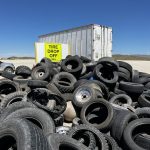
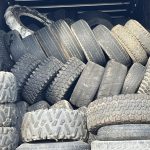
How to Recycle Tires
The Ada County Landfill can accept up to twelve (12) tires of any size. If you are depositing more than 12 tires or if you are depositing large tractor tires, please call ahead for approval. The fee for each tire is $5.00. Tires can be deposited with rims.
Tires delivered to the landfill are recycled through a privately owned company.
Sample Reuses
- Athletic tracks
- Road base
- Fuel in the process of making cement
Questions?
Ada County Landfill
(208) 577-4725
[email protected]
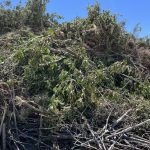
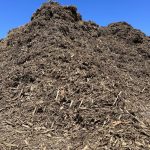
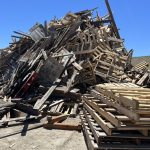
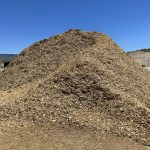
How to Recycle Wood
What is Acceptable?
Basically, anything that can be turned into wood chips is acceptable in the wood recycling program at the Ada County Landfill.
- Shrubs
- Tree limbs
- Doors
- Wooden fencing
- Wooden Spools
- Wood lap siding
- Old bark
- Plywood
- Particleboard
- Sawdust
- Clean lumber
- Pallets
What About Nails and Other Fasteners?
There is no need to remove nails, screws, hinges, or other metal fasteners (provided they are not large steel fasteners). Small fasteners pass through the grinding and screening equipment and are picked up by powerful magnets. The metals collected from the wood grinding process are shipped to a metals recycling company.
What is not accepted?
- Painted, stained, or lacquered wood
- Any wood that has been treated with any chemical
- Burned wood
- Thorns and brambles
![]()
How to Recycle Christmas Trees
After the holiday season, Ada County accepts Christmas trees at no charge for a limited time. Watch for new dates next year.
Curbside Christmas Tree and Wood Waste
Wood waste and Christmas trees are handled differently, depending on location.
- Cut to 4-foot lengths or shorter
- Remove decorations: lights, ornaments, tinsel and stand
- Flocked trees are not accepted (they become ordinary waste)
Wood, whether in its natural form, such as tree limbs, shrubs or bushes, or in a processed form, such as lumber, takes up considerable space in landfills. Ada County Landfill partners with a contractor to mulch wood for a variety of reuse purposes.
10,000 cubic yards of wood chips diverted at the landfill monthly.
Interesting Facts:
- One of the largest recycling programs in Idaho is run by the Ada County Landfill. It’s the county’s wood waste recycling program, reclaiming around 150,000 cubic yards of waste each year.
Sample Reuses
- Fuel supplement at electricity co-generation plants
- landscaping
- Compost feedstock (starting materials for composting)
- cattle bedding
Questions?
Ada County Landfill
(208) 577-4725
[email protected]
